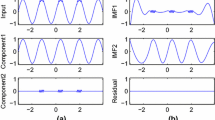Abstract
An approximated empirical mode decomposition generates a set of approximated intrinsic mode functions via a linear, nonadaptive but iterative approach. The decomposition was found to be very useful for a content-independent pattern recognition application. As the process is characterized by a system kernel matrix and performed iteratively, the approximated intrinsic mode functions can be understood as the original signals processed by a set of mask operations. Here, some properties of the decomposition are studied and an optimal design of the system kernel matrix is proposed. It is found that there is only one approximated intrinsic mode function if the exact perfect reconstruction condition is satisfied. Obviously, the approximated intrinsic mode function is the original signal. Therefore, the decomposition is practically not meaningful. To address this issue, the infinite number of iterations in the algorithm is truncated to a finite number of iterations. Also, the design of the system kernel matrix is formulated as an optimization problem. In particular, the exact perfect reconstruction error between the sum of the approximated intrinsic mode functions and the original signal is minimized and the total absolute sum of the difference between any two different eigenvalues of the iterative matrix is maximized subject to a stability condition. Here, the stability condition refers to the eigenvalues of the iterative matrix being between zero and one. Since the optimization problem is nonsmooth and nonconvex, a genetic algorithm is employed for finding its near global optimal solution. Compared to the conventional approximated empirical mode decomposition, computer numerical simulations show that our proposed approach can achieve more than one approximated intrinsic mode function with each approximated intrinsic mode function corresponding to an output of a more meaningful mask operation.

Similar content being viewed by others
Explore related subjects
Discover the latest articles and news from researchers in related subjects, suggested using machine learning.References
Qin, Y., Tang, B., Mao, Y.: Adaptive signal decomposition based on wavelet ridge and its application. Signal Process. 120, 480–494 (2016)
Jianlou, X., Feng, X., Hao, Y., Han, Yu.: Image decomposition using adaptive second-order total generalized variation. SIViP 8(1), 39–41 (2014)
Kuang, W., Ling, B.W.K., Yang, Z.: Parameter free and reliable signal denoising based on constants obtained from IMFs of white Gaussian noise. Measurement 102, 230–243 (2017)
Yang, Z., Ling, B.W.K., Bingham, C.: Joint empirical mode decomposition and sparse binary programming for underlying trend extraction. IEEE Trans. Instrum. Meas. 62(10), 2673–2682 (2013)
Hughes, J.M., Mao, D., Rockmore, D.N., Wang, Y., Qiang, W.: Empirical mode decomposition analysis for visual stylometry. IEEE Trans. Pattern Anal. Mach. Intell. 34(11), 2147–2157 (2012)
Gao, B., Woo, W.-L., Dlay, S.S.: Variational regularized 2-D nonnegative matrix factorization. IEEE Trans. Neural Netw. Learn. Syst. 23(5), 703–716 (2012)
Ling, B.W.K., Tian, N., Ho, C.Y.F., Siu, W.C., Teo, K.L., Dai, Q.: Maximally decimated paraunitary linear phase FIR filter bank design via iterative SVD approach. IEEE Trans. Signal Process. 63(2), 466–481 (2015)
Ling, B.W.K., Ho, C.Y.F., Teo, K.L., Siu, W.C., Cao, J., Dai, Q.: Optimal design of cosine modulated nonuniform linear phase FIR filter bank via both stretching and shifting frequency response of single prototype filter”. IEEE Trans. Signal Process. 62(10), 2517–2530 (2014)
Huang, N.E., Wu, M.L.C., Long, S.R., Shen, S.S., Qu, W., Gloersen, P., Fan, K.L.: A confidence limit for the empirical mode decomposition and Hilbert spectral analysis. Proc. R. Soc. Lond. Ser. A 459(2037), 2317–2345 (2003)
Gao, B., Woo, W.-L., Dlay, S.S.: Single, channel blind source separation using EMD-subband variable regularized sparse features”. IEEE Trans. Audio Speech Lang. Process. 19(4), 961–976 (2011)
Gupta, R., Kumar, A., Bahl, R.: Estimation of instantaneous frequencies using iterative empirical mode decomposition. SIViP 8(5), 799–812 (2014)
Lin, L., Yang, Y., Zhou, H.: Iterative filtering as an alternative algorithm for empirical mode decomposition. Adv. Adapt. Data Anal. 1(4), 543–560 (2009)
Khatami, L.: The poset of the nilpotent commutator of a nilpotent matrix. Linear Algebra Appl. 439(12), 3763–3776 (2013)
Farokhi, S., Shamsuddin, S.M., Sheikh, U.U., Flusser, J., Khansari, M., Jafari-Khouzani, K.: Near infrared face recognition by combining Zernike moments and undecimated discreet wavelet transform. Digit. Signal Process. 31, 13–27 (2014)
Ling, B.W.K., Xie, L., Cao, J., Dai, Q.: Using LASSO for formulating constraint of least-squares programming for solving one norm equality constrained problem. SIViP 11, 179–186 (2017)
Ho, C.Y.F., Ling, B.W.K., Benmesbah, L., Kok, T.C.W., Siu, W.C., Teo, K.L.: Two-channel linear phase FIR QMF bank minimax design via global nonconvex optimization programming. IEEE Trans. Signal Process. 58(8), 4436–4441 (2010)
Ma, B., Xia, Y.: A tribe competition-based genetic algorithm for feature selection in pattern classification. Appl. Soft Comput. 58, 328–338 (2017)
Acknowledgements
This paper is supported partly by the National Nature Science Foundation of China (Nos. U1701266, 61372173 and 61671163), the Guangdong Higher Education Engineering Technology Research Center for Big Data on Manufacturing Knowledge Patent (No. 501130144), the Natural Science Foundation of Guangdong Province China (No. 2014A030310346) and the Science and Technology Planning Project of Guangdong Province China (No. 2015A030401090).
Author information
Authors and Affiliations
Corresponding author
Additional information
Publisher’s Note
Springer Nature remains neutral with regard to jurisdictional claims in published maps and institutional affiliations.
Rights and permissions
About this article
Cite this article
Tian, N., Wang, X., Ling, B.WK. et al. Properties of approximated empirical mode decomposition and optimal design of its system kernel matrix for signal decomposition. SIViP 13, 1173–1181 (2019). https://doi.org/10.1007/s11760-019-01461-0
Received:
Revised:
Accepted:
Published:
Issue Date:
DOI: https://doi.org/10.1007/s11760-019-01461-0




